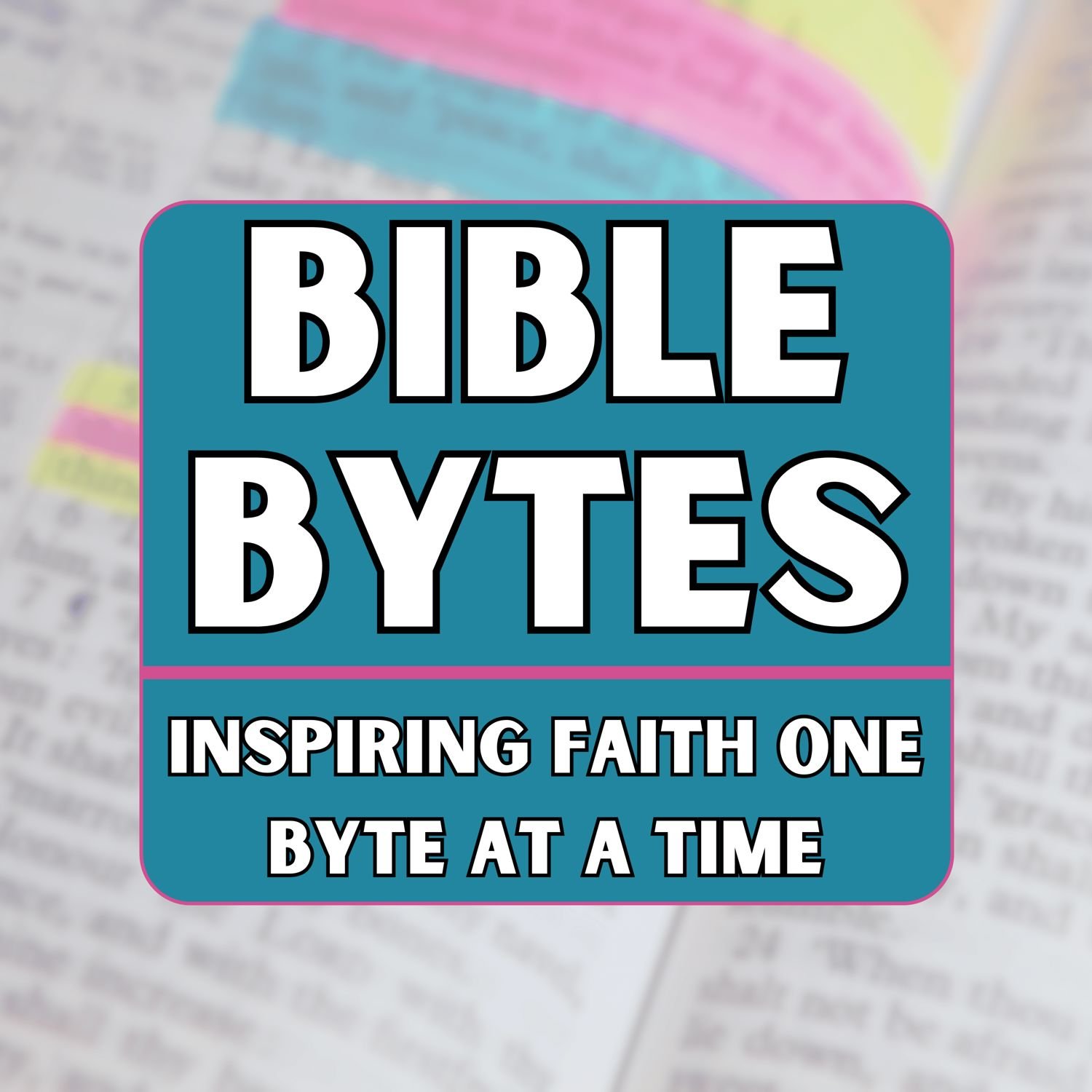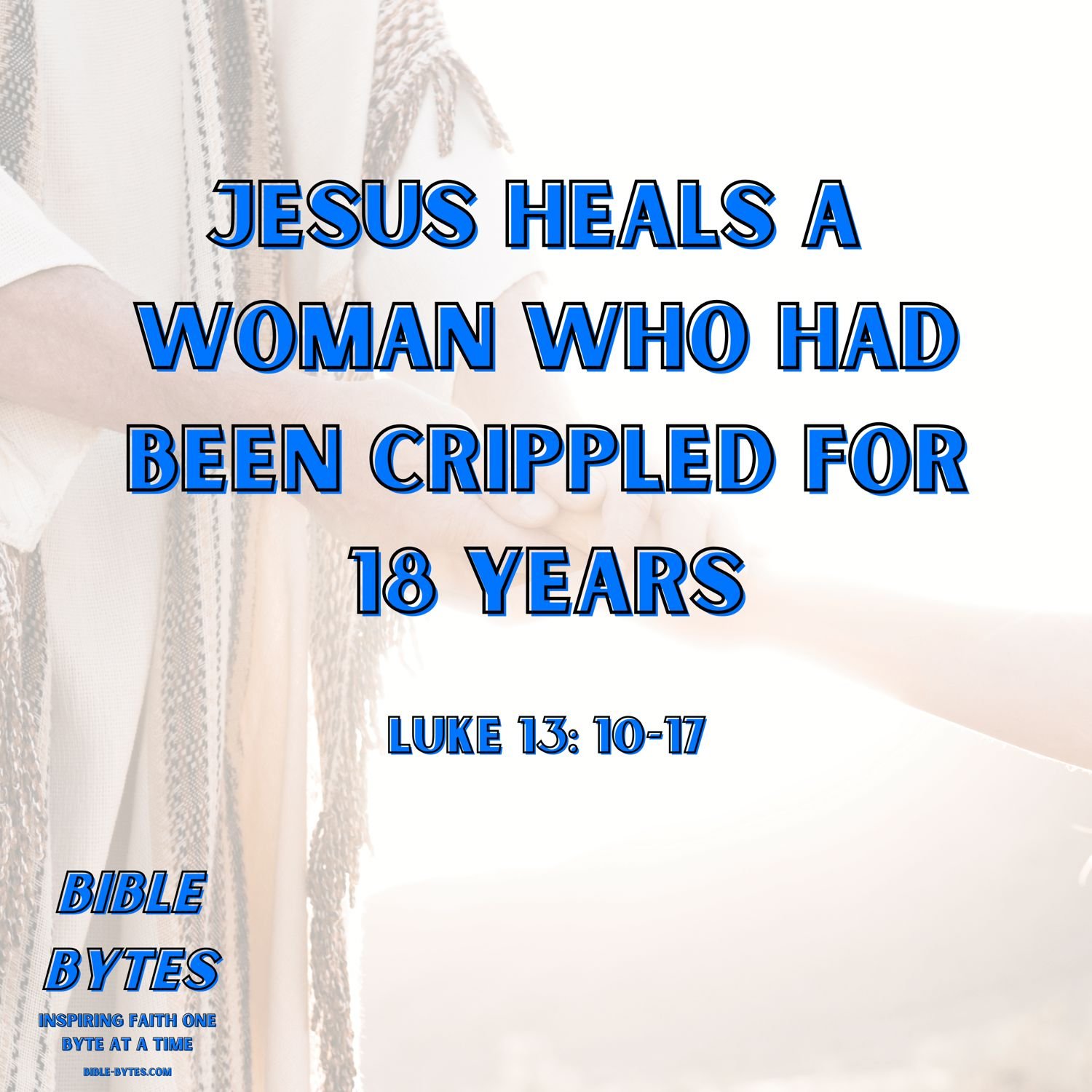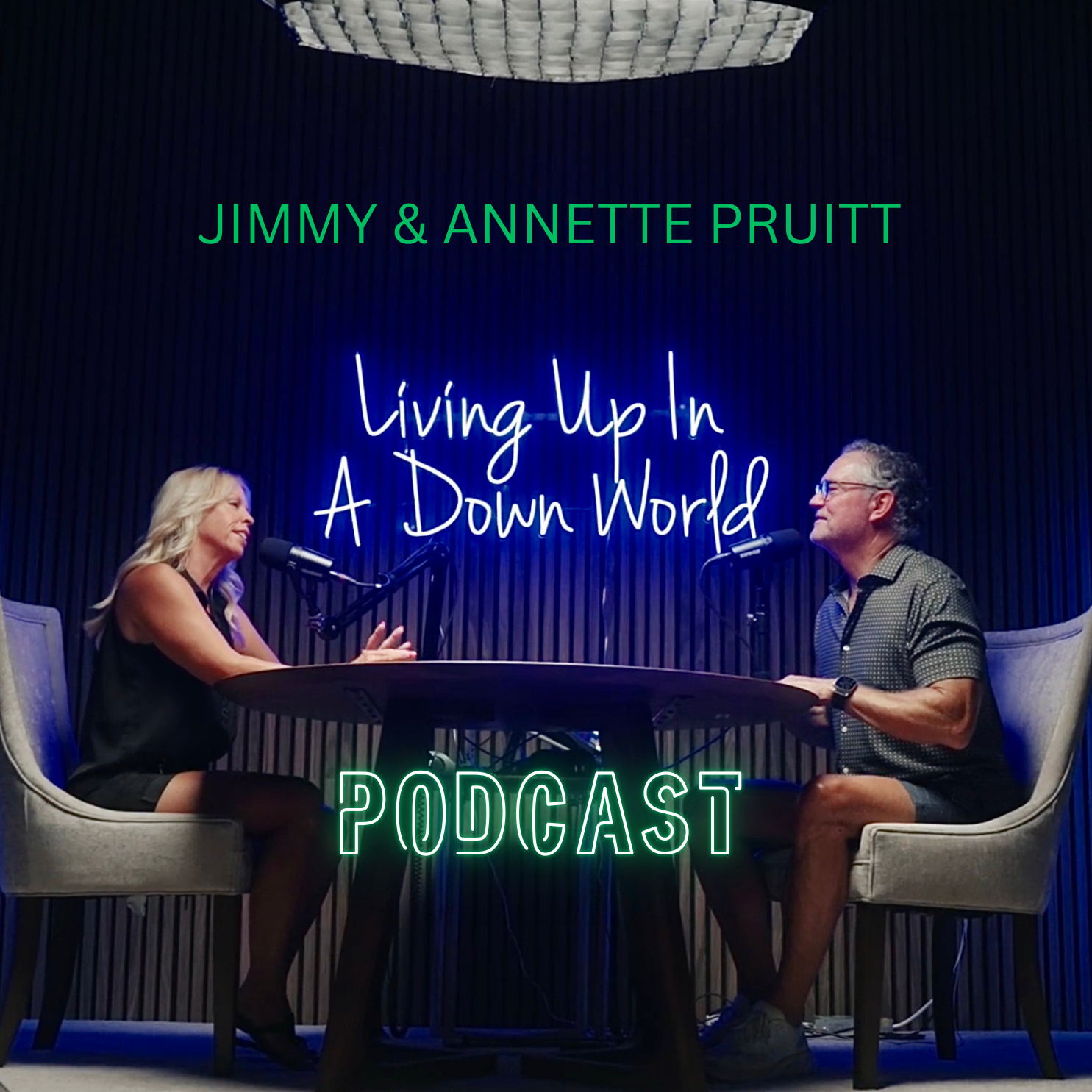Welcome to Bible Bytes, where we work to inspire faith one byte at a time.
Scripture in this Episode:
Luke 13: 10-17 (NASB)
Now He was teaching in one of the synagogues on the Sabbath. And behold, there was a woman who for eighteen years had had a sickness caused by a spirit; and she was bent over double, and could not straighten up at all. When Jesus saw her, He called her over and said to her, "Woman, you are freed from your sickness." And He laid His hands on her; and immediately she stood up straight again, and began glorifying God. But the synagogue leader, indignant because Jesus had healed on the Sabbath, began saying to the crowd in response, "There are six days during which work should be done; so come during them and get healed, and not on the Sabbath day." But the Lord answered him and said, "You hypocrites! Does each of you not untie his ox or his donkey from the stall and lead it away to water on the Sabbath? And this woman, a daughter of Abraham as she is, whom Satan has bound for eighteen long years, should she not have been released from this restraint on the Sabbath day?" And as He said this, all His opponents were being humiliated; and the entire crowd was rejoicing over all the glorious things being done by Him.
Key Takeaways:
- Jesus sees and cares for those who are suffering, even when others overlook them.
- True worship and obedience to God involve acts of compassion and mercy.
- The freedom Christ offers is holistic, addressing both physical and spiritual needs.
- Legalism can hinder our ability to experience and share God’s grace.
- Jesus’ authority over affliction reminds us of His power to bring restoration and hope.
Value 4 Value:
This podcast operates under the Value 4 Value model. We hope that we are providing value through the work we are doing, and that you would then, in turn, provide value back to us. This can come in three forms: time, talent, or treasure.
To learn more about the Value 4 Value model and how we apply it to this show, head over to our website and read up on it at https://bible-bytes.com/v4v.
Prayer Requests:
Head to our website (https://bible-bytes.com/contact) and fill out the contact form to make a prayer request or send it to us in a boost in a modern podcast app.
Bible Bites, the podcast where we work to inspire faith one bite at a time. I'm your host, Randy Black. In the Gospel of Luke, chapter 13, we witness Jesus demonstrating his boundless compassion and divine authority by healing a woman who has been bound by a disabling spirit for 18 years. This miraculous act not only showcases his power over physical and spiritual affliction, but also highlights the conflict between legalism and grace. Through the lesson of this scripture, we're going to explore the significance of the event, its implications for our lives, and the freedom that Christ offers to all who come to him in faith.
As we do each and every episode here on the show, we're going to open up before we start our study of the scripture with a word of prayer. Heavenly Father, we come before you with humble hearts, seeking to understand your word and grow in faith. Thank you for the example of compassion and freedom that Jesus displayed in healing the woman who was crippled. Open our minds to grasp the depth of your grace and open our hearts to live in the freedom that you offer. May this lesson from this scripture inspire us to embrace your love, and reflect it to those around us.
In the name of your Son, Jesus, our Savior, we pray. Amen. Luke chapter 13, verses 10 through 17. Now he was teaching in one of the synagogues on the Sabbath. And behold, there was a woman who for 18 years had had a sickness caused by a spirit, and she was bent over double and could not straighten up at all. When Jesus saw her, he called her over and said to her, Woman, you are freed from your sickness. And he laid his hands on her and immediately she stood up straight again and began glorifying God. But the synagogue leader, indignant because Jesus had healed on the Sabbath, began saying to the crowd in response, There are six days during which work should be done, so come during them and get healed and not on the Sabbath day.
But the Lord answered him and said, You hypocrites! Does each of you not untie his ox or his donkey from the stall and lead it away to water on the Sabbath? And this woman, a daughter of Abraham as she is, whom Satan has bound for eighteen long years, should she not have been released from this restraint on the Sabbath day? And as he said this, all his opponents were being humiliated, and the entire crowd was rejoicing over all the glorious things being done by him. In this passage of Scripture, Jesus was teaching in a synagogue on the Sabbath, a day set apart for rest and for worship.
Among the congregation was a woman who had been physically and spiritually afflicted for 18 years. Her condition had left her bent over, unable to stand upright, symbolizing the burden she carried both physically and spiritually. Despite her suffering, she was present in the synagogue, demonstrating her faith and hope in God. Jesus noticed her, called her forward, and declared her freedom from her affliction. His words, Woman, you are freed from your sickness, were not only a proclamation of healing, but also an act of profound compassion. By laying his hands on her, he affirmed her worth and dignity.
Her immediate healing led her to glorify God, a response of gratitude and of worship. The reaction of the synagogue leader revealed the tension between legalism and grace. He objected to the healing, citing the Sabbath law as justification. Jesus countered by exposing the hypocrisy in their interpretation of the law, pointing out that acts of compassion, such as untying an animal to provide water, were permissible. How much more, then, was it appropriate to free a daughter of Abraham from bondage on the Sabbath? Jesus' response emphasized the priority of mercy over ritual.
By healing this woman, he demonstrated that the Sabbath, rather than being a rigid set of rules, was a day for restoration and liberation. His actions and words humiliated his opponents, while the crowd rejoiced, celebrating the manifestation of God's power and God's glory. This account illustrates Jesus' mission to set the captives free, both physically and spiritually. It also challenges us to reflect on our own understanding of grace and our willingness to prioritize compassion over legalistic traditions. We have some key takeaways from this scripture in today's lesson.
The first is that Jesus sees and cares for those who are suffering even when others overlook them. The woman in the synagogue had been crippled for 18 years, yet she remained faithful attending worship despite her condition. Jesus noticed her amidst the crowd and took the initiative to heal her. This demonstrates that God sees each of us in our struggles, even when we feel invisible or forgotten. His care for the suffering reflects his character as a compassionate and loving Savior who values every individual. This should encourage us to trust that he is aware of our pain and is working for our good, even when others may not understand or acknowledge our struggles.
True worship and obedience to God involve acts of compassion and mercy is our next takeaway. Jesus' healing of the woman on the Sabbath challenged the rigid interpretation of the law held by the religious leaders of the day. He showed that honoring God is not about legalistic adherence to rules, but about reflecting his love and mercy. By prioritizing the woman's healing, Jesus taught that acts of compassion are indeed a form of worship. This calls us to examine our own lives and ensure that our faith is marked by kindness and love for others, especially those who are in need.
Our next takeaway is that the freedom Christ offers is holistic, addressing both physical and spiritual needs. The woman's healing was not only physical, but also spiritual. Jesus declared her freedom from bondage, addressing both her immediate physical condition as well as the spiritual oppression she had endured. This reminds us that Christ's work in our lives is comprehensive, bringing healing and restoration to all areas of our being. It encourages us to seek his freedom in our lives and trust him to bring wholeness where we are broken. Our next takeaway is that legalism can hinder our ability to experience and share God's grace.
The synagogue leader's objection to Jesus' healing highlights how legalism can blind us to the work of God. By focusing on rigid rules, the leader failed to celebrate the miraculous healing and the joy that it brought. This serves as a warning to avoid letting legalistic attitudes prevent us from recognizing and participating in God's grace. Instead, we should embrace the freedom and love that Christ offers and extend it to others. Our final takeaway is that Jesus' authority over affliction reminds us of his power to bring restoration and hope.
Through his words and actions, Jesus demonstrated his authority over both physical and spiritual bondage. His ability to heal the woman instantly revealed his divine power and compassion. This gives us confidence in his ability to address the challenges and afflictions that we face. It also inspires hope, knowing that no situation is beyond his power to redeem and to restore. This passage of scripture prompts us to ask ourselves whether we have truly internalized the compassion and mercy that Jesus exemplifies. The woman's long-term suffering is a reminder that life's burdens can sometimes feel overwhelming.
Yet, her presence in the synagogue demonstrates resilience and faith. Are we similarly steadfast in seeking God even when weighed down by trials? This challenges us to remain faithful and to trust that God sees our struggles and will act in his perfect timing. Jesus' confrontation with the synagogue leader also invites us to examine our own hearts. Are we more focused on maintaining traditions or appearances than on showing love and mercy to those in need? His rebuke of legalism compels us to prioritize compassion over rules. It's a call to be mindful of how we view others and to ensure that our actions reflect the grace that we have received.
Furthermore, the woman's immediate response of glorifying God serves as an example of gratitude and worship. When God works in our lives, do we respond with similar praise and acknowledgement of his goodness? This reflection challenges us to cultivate a heart of thankfulness, celebrating the blessings and deliverance he provides. The crowd's reaction, too, is significant. Their rejoicing shows the power of community in affirming and celebrating God's work. It encourages us to share testimonies of his faithfulness and to build one another up in faith. Are we actively participating in such a community and do we rejoice in the blessings of others?
Finally, the passage reminds us of the holistic freedom that Christ offers. The woman was freed from both physical and spiritual bondage. Similarly, Jesus invites us to bring all of our burdens to him, trusting in his ability to bring restoration. Are there areas of our lives where we still hold on to bondage or refuse to surrender control? His power to heal and liberate is available to all, to all who come to him in faith. As we do each week, let's close out our study of the Scripture with another word of prayer. Dear Lord, thank you for the freedom and restoration that you offer through your Son, Jesus, to everyone who come to him in faith.
Help us to see the need and respond with compassion, following his example. Guard our hearts against legalism and teach us to prioritize love and mercy in all we do. May we continue to rejoice in Jesus' works and glorify him with our lives. Embrace us to share the message of grace and hope with others, that they too may experience the healing and the freedom that you and your Son provide. In the name of your Son, Jesus, we pray. Amen. This podcast supports Podcasting 2.0, so feel free to send us a boost if you are listening on a new podcast app.
Find your new app now at podcasting2.org slash apps. That's podcasting2.org slash apps. Here at Bible Bytes, we operate under what's known as the value-for-value model. We provide you these episodes each week at no cost, hoping that they provide value to you and that ultimately you would then provide value back in one of the three forms under that model. And that's in the areas of time, of talent, and of treasure. Time is as simple as taking the time each week to listen. It can also be taking the time to share an episode with someone else and say, hey, check this out, the episode of this podcast.
It was really good. I think it could touch you or help you in some way. Talent would be offering to step up and assist us in some way with something related to the show it could be making cover art it could be providing us topic ideas or scripture ideas to build topics off of it could be offering to help write uh and script out episodes it could be offering to work on our website for us as we are now working and preparing to move to a new website um and build that up. It could also even be stepping up and saying, hey, I want to be on this show. I want to record with you and help. And we would gladly welcome that.
And the last area is in treasure. Treasure would be something that would be, in this case, financial in nature. If you're listening in a modern podcast app, you can stream, currently stream Satoshi's small, very, very small micro payments, small pieces of Bitcoin to the show through those apps. You could also send a boost or a boostagram into the show. A boost is just a one-time pledge of support in an amount of sats, and a boostagram would include a message with that pledge of support. You can also head to our website. There on the website, there's an embedded widget where you can provide support to us through PayPal.
PayPal Venmo is listed there, so ways to do that. We also have links there that you can provide support through Strike. Strike is an app where you can connect it to your bank. It's offered by a bank and send funds that way. You can also use it to do Bitcoin and cryptocurrency as well and send that through. And you also have the option there to help us in our production. We use a tool called Auphonic. And if you would like to purchase one-time credits in that for us, there's a link on the web page there as well to do that. If you want to learn more about the whole value for value model and what it is and then how we use it and apply it to the show, you can head over to our website and read up on it.
You can do that by heading over to Bible-bytes.com slash V4V. Again, that's Bible-bytes with a Y, B-Y-T-E-S dot com slash the letter V, the number four, and the letter V. We hope that if you have a prayer request, you would reach out to us. We have some means to contact us on our website. You can also send it through a boostagram from one of the modern podcast apps. That we might take that request and share it with our audience so that we all can come together and lift those requests up to the Lord. We're going to continue with prayer requests we've had recently here on the show. My dad, as he continues his cancer treatments, he's tired.
The radiation, it wears him out. It zaps a lot of his energy. But he's doing well with that. He's got a little bit more to go, and then the doctors are going to take a look and see how things are going and decide if things are beat or if we're going to have to proceed with some more treatment. So keep him in your prayers. Also remember to lift up that he might return to services with other Christians to worship and praise and be a part of that each day. Continue to remember my mom as she works with him through that and everything, that she has the patience, that she has the...
She has just the ability to keep him on track and keep him positive and support him in whatever ways he needs, but also that she also might return to go into services and worshiping weekly. We're going to continue to remember family friend Greg as he goes through and prepares for the situation dealing with the results of the biopsies and cancers and things they found for him. Again, Tim Kolekka. Tim is a dear friend, a good Christian man. Tim is dealing with some health issues. We lift him up. Continue to lift me up. I'm handling the transition of medications well. I've been on a streak of trying to get weight off since the end of September when the type 2 diabetes diagnosis was given to me.
And in a four-month window, I've lost right at 25 pounds. So I'm on a trajectory going in the right way. So continue to remember me as I'm working through that, that things will continue to get better. I've handed it over to God and hoping that His will is for me to continue to get better. I still remember the people who are dealing with the fires in California, the devastation that's caused, the loss of property, the loss of life that's occurred. But remember them that God can help them to see the way and help them in recovery from that. We also want to just remember the nation, the United States.
We've gone through a transition this week in a change in administration and at the top with the presidency. So remember, our president here as he is working to do what he feels is or he's led to do, as well as members of Congress and all the administration officials who are going through confirmation process and everything, that they can keep us on a track that helps to continue to make America, make the United States. It's a nation that is an example for the world. So, as we do each week, before we talk about what's going to be on our next episode, let's close out with a word of prayer.
Heavenly Father, we once again thank you for this chance to come together, to learn from your word and share it with others. We lift up these requests as we do each week. Continue to please to touch and bless my dad and my mom, family friend Greg, Tim Keletka, and myself. Also, all of those individuals affected by these tremendous fires and things going on in California and our nation, the United States as a whole, that we may be on a path, on a trajectory that is better for us and meets your will for us today. Also, any unspoken requests that members of our audience may have, we lift those up as well.
You know what these requests are, and we put our faith in you, our trust in you, that you can provide answers to those in the way that you see fit into your will. Each week, we strive to share the word, your word, with our audience and those who may not be saved. That the ultimate hope is that they might accept your son Jesus as their Savior and then spend eternity with all of us in heaven who are saved as well as you and your son. It's in the name of your son that we pray. Amen. On our next episode of Bible Bites, we're going to hit miracle number 31 in our series. That means we're getting close to the end of the series. There's only 37 documented miracles.
But 31 is going to be when Jesus heals a man with what's called dropsy or edema, but he does so on the Sabbath. If you want to read about that ahead of time, you can find that by going to the book of Luke, looking at chapter 14, and then looking at verses 1 through 6. So please join us on the next episode of Bible Bites, the podcast where we work to inspire faith one bite at a time. Bible Bites, Bible Bites, inspiring faith one bite at a time. With every verse, we find our way to live our lives in His light and shine. Bible Bites, Bible Bites Inspiring faith one bite at a time Bible Bites





